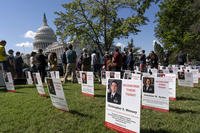British-American celebrity chef Robert Irvine loves the U.S. military so much he has a fresh-concept restaurant in the Pentagon. Now, he's turning his attention to Army chow halls, with an eye to improving the health and taste appeal of food offerings for soldiers.
Irvine held a teleconference with Army senior leaders Aug. 11 to lay out a blueprint for revamping the service’s dining facilities, according to an Army release. In attendance was Sergeant Major of the Army Michael Grinston, among others.
Read next: 1 Crew Member Hurt After Bullet Strikes Air Force Helicopter Over Virginia
The chef, host of the popular TV show "Restaurant: Impossible," joined the British Royal Navy at age 15 and became a U.S. citizen in 2007. At 54, he’s now using his professional experience and insight to improve national fitness and nutrition. His latest project: to improve the Army's dining facilities, or DFACs, in an effort to make them every soldier's preferred eatery.
"[Revamping DFACs] is no different than what I do on TV," Irvine said during the call. Bringing troops into the DFAC should offer them "30 minutes of escapism" during their workday, he added, according to the release.
According to Grinston, goals include adding more protein options at the salad bar, as well as widespread installation of credit and debit card machines to save soldiers time.
"We're seeing improvements, but we're not there yet," Grinston said during the teleconference, adding that the real challenge is that "we need to bring folks into the buildings."
It’s not clear from the release what the timeline is to make the changes Irvine and Grinston listed. Army leaders have long cited concerns with poor soldier nutrition. In July, Grinston said improving soldiers’ eating habits is more important to their overall health than the new, more challenging Army Combat Fitness Test, and once again raised the prospect of removing deep-fryers from Army DFACs in an effort to push troops toward healthier choices.
In the recent call, Grinston said marketing, customer service and customer satisfaction are three main priorities of the DFAC revamping effort.
One idea floated by Irvine is giving troops consistency with an established menu -- something he said can attract soldiers from a marketing standpoint, saving "the laborious task" of creating new menus weekly.
"If you give soldiers what they want, they will eat there," he added.
DFACs can accomplish this with great food and service, which is "not too expensive" for troops and increases their satisfaction, Irvine said.
Providing comfort and great food to soldiers, which can put them in a relaxed headspace during the workday, is the way to improve customer service, he said. Such an approach "can get more out of them" and improve their quality of work, which is vital with the upcoming Army Combat Fitness Test in October.
"Food [may be] the missing part" to succeed in the fitness test, he said.
Grinston agreed. He has reminded troops that eating healthy food is almost as important as physical conditioning.
"We want our soldiers to be fit for their jobs," Grinston said on the call. "I'm passionate about what we provide our soldiers. The most valuable thing is that we're learning as we go."
Irvine said educating troops on eating right "is a continual process."
Better DFACs can help modernize the nutritional needs of the Army, Grinston said, adding that enhancing nutritional options and delivering meals more quickly will help the cognitive and physical performance of individual soldiers.
-- Hope Hodge Seck contributed.
-- Bing Xiao can be reached at bingxiao2020@u.northwestern.edu.
Related: SMA Once Again Proposes Pulling Deep-Fryers Out of Army Chow Halls














